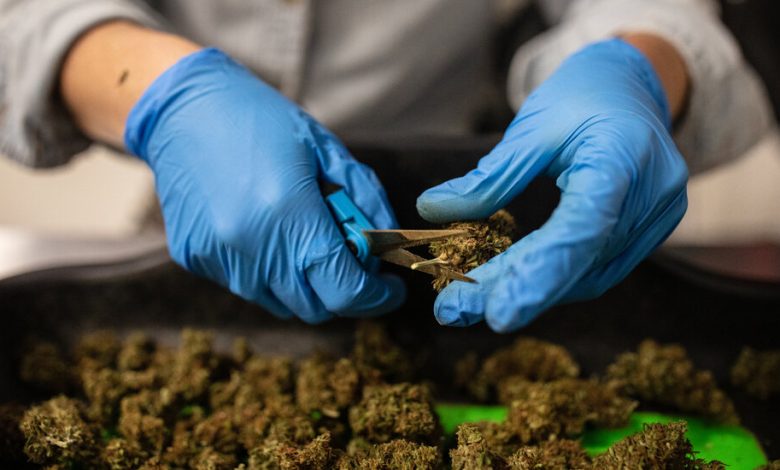F.D.A. Seeks More Authority to Oversee CBD Products

Four years after Congress legalized hemp, spawning a vast, unregulated market for cannabidiol-infused beverages, gummies and lotions, the Food and Drug Administration said on Thursday it lacked the authority to regulate such products. Instead, the agency called on federal lawmakers to give it a stronger regulatory framework to address the health claims and safety concerns that have dogged the prolific CBD industry.
Dr. Janet Woodcock, the F.D.A.’s principal deputy commissioner, said the agency’s existing regulatory methods governing the sale of food additives and dietary supplements were inappropriate for products containing CBD, the hemp-derived chemical whose promoters ascribe to it a dizzying welter of health benefits.
Unlike tetrahydrocannabinol, or THC, the cannabis component that gets users high, CBD is not psychoactive. But there is little data to back up marketing claims that CBD can prevent diabetes, soothe anxiety or ease menstrual cramps.
In a statement, Dr. Woodcock said an internal committee that she led at the agency was concerned about the overall paucity of scientific literature on CBD, and that some research suggested long-term use might be associated with liver toxicity and damage to men’s reproductive systems. Also unclear, she said, was whether CBD was safe for pregnant women and children. “For example, we have not found adequate evidence to determine how much CBD can be consumed, and for how long, before causing harm,” she said.
The agency, which has a stricter review process for prescription drugs, has very relaxed oversight powers for consumer products like cosmetics and dietary supplements. It does not vet such products before they reach the market, but mainly responds to complaints of dangerous ingredients before investigating or trying to get them removed from store shelves.
While waiting for Congress to decide whether to give it more control, the agency will continue to take action against companies that make specific health claims about CBD products, she said. “We will remain diligent in monitoring the marketplace,” Dr. Woodcock said.
Industry groups expressed disappointment with the decision. They said they worried that the matter could languish in a closely divided Congress, despite bipartisan support for an industry that grew to nearly $6 billion in the four years since lawmakers removed hemp from the federal list of controlled substances.
“The idea that we need to start from scratch on a completely new regulatory pathway is of great concern to us,” said Jonathan Miller, counsel for the U.S. Hemp Roundtable, a trade association.
He and other industry supporters had been urging the F.D.A. to use existing regulatory frameworks for CBD. On Thursday, the agency definitively quashed that idea by rejecting petitions from three groups that had asked the F.D.A. to regulate CBD products the way it oversees dietary ingredients like caffeine, ginseng and echinacea.
Jonathan Havens, a former legal counsel at the F.D.A. who now represents companies in the CBD industry, said many growers and manufacturers had grown frustrated with the F.D.A.’s inaction, which has contributed to a chaotic marketplace that has created confusion for consumers and financial uncertainty for businesses.
“The F.D.A. has never wanted to deal with this issue,” he said. “And although that’s regrettable, it would be less regrettable if we knew that in 2018 and Congress could have dealt with it, particularly at a time when Congress wasn’t so sharply divided and bills more regularly emerged from both houses and reached the president’s desk.”
Amid the regulatory vacuum, more than two dozen states have taken up CBD legislation, producing a patchwork of laws.
Members of Congress have long expressed impatience with the F.D.A. on CBD regulation. Last September, a bipartisan group of legislators sent a letter to the agency complaining about its lack of cooperation on proposed legislation aimed at resolving the matter.
On Thursday, several lawmakers who have worked on the issue expressed guarded optimism that Congress would be able to tackle the issue.
“I’m encouraged by the F.D.A.’s announcement today and looking forward to finding a path forward,” Representative Angie Craig, Democrat of Minnesota, said in a statement, echoing remarks from Representative Morgan Griffith, a Virginia Republican who previously joined Ms. Craig to sponsor CBD legislation in the House.
But other legislators struck a more combative tone. Representative James Comer, a Republican from Kentucky and the new chairman of the House Oversight and Accountability Committee, said he would use his committee position to investigate the F.D.A.’s decision to shift the matter to Congress.
“The F.D.A. failed for too long to take steps to ensure the safety of hemp-derived dietary products, putting the health and safety of the American people at risk,” he wrote. “We need to be sure that the F.D.A. is not using this as an opportunity simply to leverage more authority and resources from Congress.”
